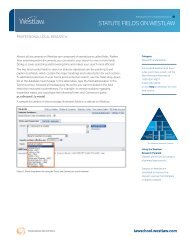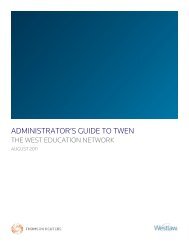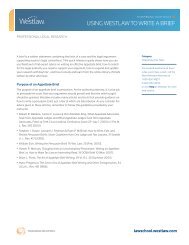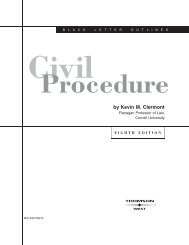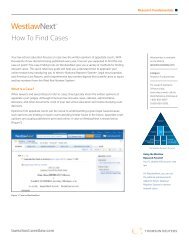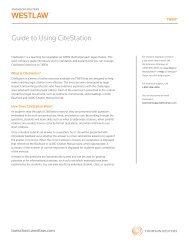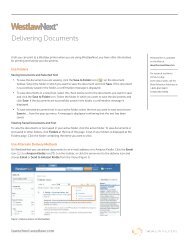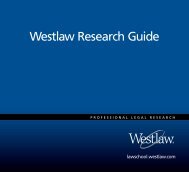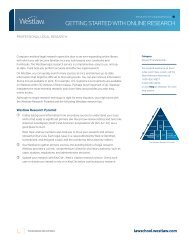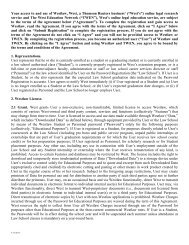Winning Research Skills - Westlaw
Winning Research Skills - Westlaw
Winning Research Skills - Westlaw
You also want an ePaper? Increase the reach of your titles
YUMPU automatically turns print PDFs into web optimized ePapers that Google loves.
Chapter 3<br />
State constitutions contain provisions that parallel most of the fundamental rights guaranteed by<br />
the U.S. Constitution. There is an interrelationship between a state’s constitution and the U.S.<br />
Constitution. In some areas of the law, such as an individual’s right to privacy, the protection<br />
offered by a state constitution may exceed what has been held to be available under the U.S.<br />
Constitution. State constitutions can usually be found in the printed state codes. On <strong>Westlaw</strong>,<br />
the constitutions for most states are available in the state statutes databases.<br />
Court Rules<br />
Court rules guide the operation of courts. Court rules typically cover such matters as forum<br />
selection, commencing an action, pleadings, discovery, jury selection, the trial, and the<br />
judgment. The various federal court rules may be found in a variety of practitioners’ manuals,<br />
rules services, and formbooks.<br />
Among the most accessible sources of court rules are the USCA special volumes accompanying<br />
title 28, Judiciary and Judicial Procedure, and title 18, Crimes and Criminal Procedure, which<br />
contain the federal court rules, including the Federal Rules of Civil Procedure, Criminal<br />
Procedure, Appellate Procedure, and Evidence.<br />
On <strong>Westlaw</strong>, the Federal Rules database (US-RULES) contains rules from the USCA. State court<br />
rules are found in databases with the identifier XX-RULES, where XX is a state’s two-letter<br />
postal abbreviation, e.g., FL-RULES.<br />
Conclusion<br />
This chapter explained how to find federal laws as they are passed by Congress and organized<br />
into the federal code. We discussed several legislative document publication formats, each of<br />
which is suited to a different purpose. We also touched on state legislative materials,<br />
constitutions, and court rules. Although you may not need to perform much legislative research<br />
during your first year of law school, the information in this chapter will come in handy in upperlevel<br />
courses and as you begin to practice.<br />
40 <strong>Winning</strong> <strong>Research</strong> <strong>Skills</strong>





